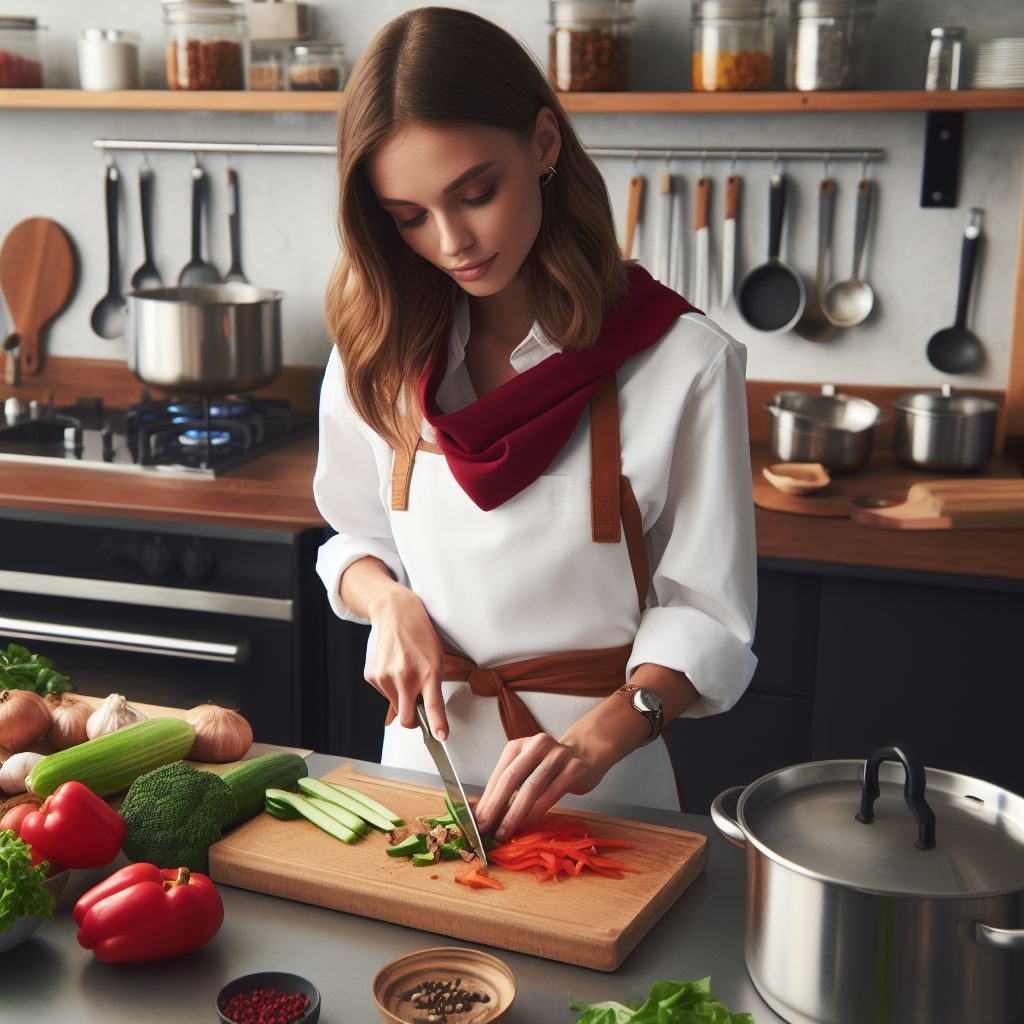Introduction
Importance of work-life balance
Work-life balance is a concept that holds immense importance in today’s fast-paced world.
With the constant hustle and bustle of life, maintaining a harmonious equilibrium between work and personal life is essential for overall well-being and success.
Being a chef can be both rewarding and demanding. A glimpse into a chef’s daily life reveals a hectic schedule filled with long working hours and a high-pressure environment.
From early morning preparations to overseeing every aspect of the kitchen, their days are filled with continuous action.
Overview of a chef’s busy daily life
Chefs tirelessly strive to craft exquisite dishes while managing a team of kitchen staff. They have to coordinate with suppliers, manage inventory, and ensure a smooth flow of operations.
Their expertise in creating culinary masterpieces demands unwavering dedication, creativity, and precision.
In addition to the kitchen duties, chefs also face challenges in maintaining a healthy personal life. The demanding nature of their profession often leads to limited time for relaxation, family, and self-care.
Balancing work commitments with personal obligations becomes a constant struggle they have to contend with.
Nonetheless, actively pursuing work-life balance is crucial for chefs. It not only improves their mental and physical well-being but also enhances their overall performance in the kitchen.
By ensuring dedicated time for leisure activities, family, and self-care, chefs can reduce stress and rejuvenate their creative spirit.
Basically, Work-life balance is of utmost importance in the fast-paced life of a chef.
The demanding nature of their profession highlights the need to prioritize personal well-being alongside their culinary prowess.
Striving for a harmonious balance between work and personal life will ultimately lead to a more fulfilling and successful career in the culinary world.
Daily routine of a chef
Early mornings and preparation for the day
- Chefs start their day early, often before sunrise, to prepare for the busy day ahead.
- They check inventory, receive deliveries, and ensure all necessary ingredients are available.
- Kitchen equipment and tools are inspected, cleaned, and prepared for use.
- Menus are reviewed and any changes or special requests are taken into consideration.
Planning and organizing menus
- Chefs carefully plan and design menus based on the restaurant’s concept and customer preferences.
- They consider seasonal ingredients, dietary restrictions, and the availability of ingredients.
- Menu items are grouped and organized to ensure balance in flavors, textures, and presentation.
- Special attention is given to incorporating fresh and local ingredients for optimal taste and quality.
Supervising kitchen staff and managing work shifts
- Chefs oversee kitchen staff, assigning duties and ensuring everyone is aware of their responsibilities.
- They create work schedules, taking into account peak hours and special events.
- Communication between team members is vital to ensure a smooth operation and avoid any delays or mistakes.
- Chefs also provide training and guidance to kitchen staff, promoting a positive work environment.
Hands-on food preparation and cooking
- Chefs are directly involved in preparing and cooking dishes, using their expertise and creativity.
- They chop, season, marinate, and cook various ingredients to create beautiful and flavorful dishes.
- Attention to detail and precision are crucial to ensure consistency and quality.
- Chefs constantly taste and adjust seasonings to achieve the perfect balance of flavors.
Quality control and ensuring high standards
- Chefs closely monitor the quality of ingredients and finished dishes throughout the cooking process.
- They inspect the appearance, texture, and taste of each dish to meet the restaurant’s standards.
- Any issues or inconsistencies are immediately addressed to maintain the reputation and integrity of the establishment.
- Chefs also maintain proper hygiene and sanitation standards in the kitchen to ensure food safety.
Overseeing food presentation and garnishing
- Chefs pay great attention to the visual appeal of each dish, ensuring it is aesthetically pleasing.
- They carefully plate the dishes, considering colors, shapes, and arrangement.
- Garnishes such as herbs, sauces, or edible flowers are added to enhance the overall presentation.
- Chefs strive to create an unforgettable dining experience through beautiful and visually appealing meals.
Interacting with customers and handling feedback
- Chefs often come out of the kitchen to interact with customers, answering questions and getting feedback.
- They listen to customers’ comments and suggestions, taking them into consideration for future menu improvements.
- Positive feedback is appreciated and motivates chefs to continue delivering exceptional culinary experiences.
- In case of any complaints or issues, chefs handle them professionally, ensuring customer satisfaction and resolving the problem promptly.
Essentially, a chef’s daily routine is dynamic and demanding, requiring early mornings, meticulous preparation, hands-on cooking, and a focus on quality and customer satisfaction.
A chef’s dedication and passion are essential in delivering delicious and visually stunning dishes that create memorable dining experiences for customers.
Read: Chef Attire: Understanding the Importance of Uniforms
Challenges faced by chefs in maintaining work-life balance
A chef’s daily life may seem glamorous and exciting, but it comes with its fair share of challenges. Maintaining a work-life balance can be particularly difficult for chefs due to the following reasons:
Long and irregular working hours
- Chefs often work long shifts, starting early in the morning and finishing late at night.
- The demanding nature of their job requires them to be present during peak hours, including weekends and holidays.
- These irregular working hours can disrupt personal routines and make it challenging to spend quality time with family and friends.
High levels of stress and pressure
- Chefs face intense pressure to deliver culinary masterpieces, meet customer expectations, and maintain high standards of food quality.
- The fast-paced, high-stress environment of a kitchen can take a toll on their mental and physical well-being.
- Constantly working under pressure can lead to burnout, anxiety, and difficulty in finding time to relax.
Maintaining personal relationships and social life
- The demands of a chef’s job can make it challenging to maintain personal relationships.
- They often miss family gatherings, birthdays, and special events due to work commitments.
- Socializing with friends becomes difficult when their days off don’t coincide with regular social activities.
- Spending long hours at work can limit their opportunities to form and nurture personal connections outside the culinary world.
Limited time for self-care and relaxation
- A chef’s work requires their undivided attention, leaving little time for self-care and relaxation.
- They often prioritize their customers and the kitchen over their own well-being.
- With busy schedules, it becomes challenging for chefs to engage in hobbies, exercise, or indulge in activities that help them unwind.
- Consequently, they may experience physical and mental exhaustion, leading to an imbalance in their personal and professional lives.
In closing, chefs face numerous challenges when it comes to maintaining a work-life balance.
The long and irregular working hours, high levels of stress, difficulty in maintaining personal relationships, and limited time for self-care can all take a toll on their overall well-being.
Despite these challenges, it is crucial for chefs to find strategies and support systems that allow them to strike a balance between their professional and personal lives.
By prioritizing their own well-being and seeking work environments that promote work-life balance, chefs can lead fulfilling lives both inside and outside the kitchen.
Read: Gender & Diversity: Changing Dynamics in the US Kitchens

Strategies for achieving work-life balance as a chef
Achieving work-life balance is crucial for chefs to maintain their passion and prevent burnout. Here are some effective strategies:
Prioritizing time management and setting boundaries
- Create a daily schedule that includes dedicated time for work, family, and personal activities.
- Avoid overcommitting or taking on excessive workload that could lead to long and exhausting hours.
- Learn to say no to requests or projects that don’t align with your priorities.
- Set clear boundaries by leaving work-related responsibilities at the workplace and detaching during personal time.
- Prioritize self-care activities such as exercising, spending time with loved ones, or pursuing hobbies.
Delegating tasks and utilizing the kitchen staff effectively
- Recognize the expertise of your kitchen staff and delegate tasks accordingly.
- Empower and train your team to handle responsibilities, allowing you to share the workload.
- Foster a collaborative work environment where everyone feels valued and competent in their roles.
- Regularly communicate and provide feedback to ensure efficient team performance.
- Trust your team to handle certain tasks, allowing you to focus on strategic planning and leadership.
Creating efficient workflows and systems
- Streamline kitchen operations by implementing effective systems and processes.
- Assess and optimize inventory management to avoid wastage and unnecessary expenses.
- Automate administrative tasks or invest in technology that simplifies daily operations.
- Regularly review and update menus to keep them fresh and manageable for the kitchen crew.
- Continuously seek feedback from your team to identify areas for improvement and implement changes accordingly.
Taking breaks and practicing self-care during work shifts
- Incorporate short breaks during hectic shifts to rejuvenate and avoid mental or physical exhaustion.
- Engage in stress-relieving activities like deep breathing exercises or stretching during these breaks.
- Stay hydrated and fuel your body with nutritious food throughout the workday.
- Utilize tools or technology that optimize the efficiency of tasks to free up time for self-care.
- Foster a supportive work environment where chefs can openly communicate their needs and challenges.
Developing hobbies and interests outside of the kitchen
- Find activities or hobbies that provide mental and emotional stimulation outside of the culinary world.
- Dedicate regular time to pursue these interests, allowing for a healthy work-life balance.
- Engage in social activities or join groups related to your hobbies to expand your network.
- Disconnect from work-related communication during personal time to fully enjoy your hobbies.
- Remember that having a well-rounded life not only enhances your well-being but also fuels creativity in the kitchen.
By following these strategies, chefs can achieve a healthy work-life balance and lead fulfilling lives both inside and outside the kitchen.
Read: Famous American Chefs: Their Stories, Struggles, & Successes
Insights from Successful Chefs on Work-Life Balance
Importance of Work-Life Integration Rather Than Separation
- Successful chefs emphasize the need for work and personal life to complement each other.
- They believe in integrating work tasks and personal tasks, rather than separating them completely.
- By integrating work and personal life, chefs can achieve a better sense of balance in their daily routine.
- Separating work and personal life can lead to stress and difficulty in finding time for personal commitments.
- Chefs value the flexibility of integrating work tasks and personal tasks throughout the day.
- Work-life integration allows chefs to prioritize their personal lives and well-being, along with their culinary careers.
- Chefs find that their creativity and productivity increase when they have a healthy work-life integration.
- By integrating work and personal tasks, chefs can avoid feeling overwhelmed with their responsibilities.
- They understand that work is important, but they also recognize the significance of personal time for relaxation and rejuvenation.
- Successful chefs strive to find a balance that allows them to excel in their careers while enjoying their personal lives.
Setting Realistic Expectations and Managing Time Effectively
- Successful chefs emphasize the need to set realistic expectations for themselves and their teams.
- They understand that striving for perfection in every aspect of work can lead to burnout.
- By setting realistic expectations, chefs avoid unnecessary stress and allow themselves time for personal commitments.
- They prioritize tasks based on their importance and urgency, effectively managing their time.
- Time management skills help chefs stay organized, preventing work from spilling over into personal time.
- Successful chefs delegate responsibilities to their teams, trusting them to handle tasks effectively.
- Delegation allows chefs to focus on their own responsibilities and create a work-life balance.
- Chefs utilize technology and tools to optimize their workflow and enhance productivity.
- They recognize the importance of taking breaks and resting to maintain their well-being.
- By managing their time effectively, chefs can accomplish their work tasks while finding time to spend with loved ones.
Finding Joy and Fulfillment in Both Work and Personal Life
- Successful chefs believe that finding joy in both work and personal life is essential for a healthy balance.
- They find fulfillment in their culinary careers and take pride in their accomplishments.
- Chefs seek out opportunities to learn and grow professionally, contributing to their happiness at work.
- They maintain healthy relationships with colleagues, creating a positive work environment.
- In their personal lives, chefs prioritize activities that bring them joy and help them relax.
- They spend quality time with family and friends, creating memories outside of work.
- Chefs pursue hobbies and interests that provide them with a sense of fulfillment outside of their culinary careers.
- They understand the importance of self-care and make time for activities that promote their well-being.
- By finding joy and fulfillment in both work and personal life, chefs experience a harmonious work-life balance.
- They understand that finding fulfillment in all areas of life contributes to their overall happiness and success.
Read: The Future of Cheffing: Technology’s Role in US Kitchens
Learn More: Cultural Diversity Behind the US Bar: Stories and Insights
Conclusion
Recap of the chef’s daily routine and challenges
Throughout the day, a chef faces long hours, intense pressure, and physical demands. They juggle multiple tasks while ensuring high-quality food. This can lead to stress and exhaustion.
Importance of work-life balance
Work-life balance is crucial for a chef’s overall well-being. It helps maintain mental and physical health and prevents burnout.
Encouraging chefs to prioritize self-care and overall well-being
It is necessary for chefs to take care of themselves by practicing self-care activities and creating boundaries between work and personal life. This will lead to a more fulfilling and sustainable career.
By understanding the challenges, valuing work-life balance, and prioritizing self-care, chefs can achieve a healthier and happier lifestyle.
Transform Your Career Today
Unlock a personalized career strategy that drives real results. Get tailored advice and a roadmap designed just for you.
Start Now[E-Books for Sale]
The Big Book of 500 High-Paying Jobs in America: Unlock Your Earning Potential
$19.99 • 500 High-Paying Jobs • 330 pages
Explore 500 high-paying jobs in America and learn how to boost your career, earn more, and achieve success!
See All 500 High-Paying Jobs of this E-Book
1001 Professions Without a Degree: High-Paying American Jobs You Can Start Now
$19.99 • 1001 Professions Without a Degree • 174 pages
Discover 1001 high-paying jobs without a degree! Unlock career tips, skills, and success strategies for just $19.99!




